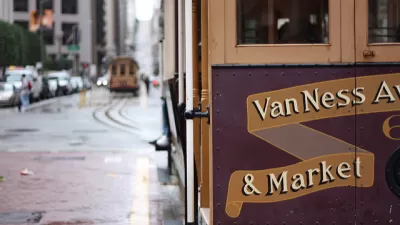Local ordinances typically try to protect residents from excess noise. In San Francisco, though, a city official is proposing policies that would protect the right of musical acts to keep rocking despite the encroachment of new neighbors.

As in many cities, many of San Francisco's small music clubs are located in marginal neighborhoods, often industrial or commercial areas, like Dogpatch or the Mission, where bands can turn up the volume without fear that they will offend neighbors. But with a housing crisis in full swing and the gentrification of formerly undesirable neighborhoods, music venues now have more neighbors within earshot, and many of them are cranky.
Bands and venue owners are pushing back against noise complaints, contending that the music scene is a vital part of San Francisco's culture. Supervisor London Breed agrees. She has sponsored an ordinance that seeks to smooth relationships between venues and residents. The ordinance would require developers to work with music venues before construction begins, to notify prospective residents of the proximity of music clubs, and to consider including mitigation measures in their project. The ordinance would prevent the forced shut-down of any venue that follows city rules, no matter how much neighbors may complain.
A petition in support of Breed's legislation has garnered 3,000 signatures.
"The soul of this city is just changing so fast, whether it's a Google bus or whatever else," Jocelyn Kane, executive director of the Entertainment Commission, told SF Weekly. "It's different now from what we saw in the '90s, with the amount of money, and the sustained amount of change. This legislation is important because it forces project sponsors to come talk to us and get our signoff."
SF Weekly reports that 2012 study from the city's Office of Economic Analysis found that San Francisco's Nightlife Industries generated roughly $4.2 billion in 2010.
FULL STORY: Noise Ordinance: London Breed Legislation to Preserve Live Music & Nightlife

Planetizen Federal Action Tracker
A weekly monitor of how Trump’s orders and actions are impacting planners and planning in America.

Chicago’s Ghost Rails
Just beneath the surface of the modern city lie the remnants of its expansive early 20th-century streetcar system.

San Antonio and Austin are Fusing Into one Massive Megaregion
The region spanning the two central Texas cities is growing fast, posing challenges for local infrastructure and water supplies.

Since Zion's Shuttles Went Electric “The Smog is Gone”
Visitors to Zion National Park can enjoy the canyon via the nation’s first fully electric park shuttle system.

Trump Distributing DOT Safety Funds at 1/10 Rate of Biden
Funds for Safe Streets and other transportation safety and equity programs are being held up by administrative reviews and conflicts with the Trump administration’s priorities.

German Cities Subsidize Taxis for Women Amid Wave of Violence
Free or low-cost taxi rides can help women navigate cities more safely, but critics say the programs don't address the root causes of violence against women.
Urban Design for Planners 1: Software Tools
This six-course series explores essential urban design concepts using open source software and equips planners with the tools they need to participate fully in the urban design process.
Planning for Universal Design
Learn the tools for implementing Universal Design in planning regulations.
planning NEXT
Appalachian Highlands Housing Partners
Mpact (founded as Rail~Volution)
City of Camden Redevelopment Agency
City of Astoria
City of Portland
City of Laramie





























